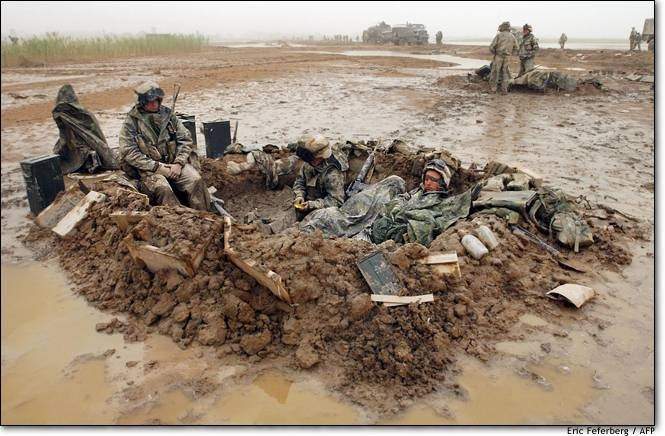
"It is not the critic who counts: not the man who points out how the strong man stumbles or where the doer of deeds could have done better. The credit belongs to the man who is actually in the arena, whose face is marred by dust and sweat and blood, who strives valiantly, who errs and comes up short again and again, because there is no effort without error or shortcoming, but who knows the great enthusiasms, the great devotions, who spends himself for a worthy cause; who, at the best, knows, in the end, the triumph of high achievement, and who, at the worst, if he fails, at least he fails while daring greatly, so that his place shall never be with those cold and timid souls who knew neither victory nor defeat."
Theodore Roosevelt"Citizenship in a Republic,"Speech at the Sorbonne, Paris, April 23, 1910
This is perhaps my favorite leadership quote. I referred to this almost daily when I served as a trainer at the Army’s National Training Center. It was too easy to become a cynic, to roll one’s eyes when those units and leaders that we were training made “seemingly” simple mistakes. But they were in the arena. They were the ones who had gone for days without sleep, who were under the constant pressure of decision making. Theirs were the faces covered with dirt, blood, and sweat. They were the doers…and I was not!
This is perhaps my favorite leadership quote. I referred to this almost daily when I served as a trainer at the Army’s National Training Center. It was too easy to become a cynic, to roll one’s eyes when those units and leaders that we were training made “seemingly” simple mistakes. But they were in the arena. They were the ones who had gone for days without sleep, who were under the constant pressure of decision making. Theirs were the faces covered with dirt, blood, and sweat. They were the doers…and I was not!
Isn’t this what leadership is all about? Getting in the arena…making decisions…being held accountable for what we do? Being willing to take risks…and at least falling forward when we fail?
Leadership is not about standing on the sidelines and telling people how easy it is to hire, fire, make decisions, or execute (apologies to all those authors and “motivational speakers” who never held a meaningful leadership position!). It’s not about being a critic or, at worst, a cynic, who does not give credit to those who try!
Leadership in the arena is about putting yourself out there…and doing it. It’s about failing and learning from mistakes. It’s about taking on increasing leadership responsibilities, earning the right to lead…paying your dues. It’s about faces covered with dirt, blood, and sweat!
Here’s to the “Man in the (leadership) arena!” Hooah!
3 comments:
Tom, that is such a great quote. I've always believed that nobody has truly failed as long as they're alive, because no matter how bad things are they can pick themselves up and do it again, learning from their mistakes and doing it better. (I think it's called growth:)
I think there are some things of value that can be offered by someone outside the arena. One is objective information, not judgment, and the other is additional tools for use in the arena. However, no matter how often you explain how to use a hammer it's not until that person is building the house that he will truly understand. And once he does he will tweak what you told him so that the hammer works better FOR HIM. Likewise, he'll use the information as HE CHOOSES whether the source agrees or not. (the male pronoun was strictly for convenience)
Tom,
What a wonderful post & quote. Super stuff, and one I will share with my own management team!
Reading your "About" description made me laugh -- I just finished reading the book called Step Up! How to Win More and Lose Less in Business! by Daniel Grissom. It's definitely right up your alley in its focus on creating excellence in business (and in life). It's a quick read, and is filled with lots of inspiring quotes as well. Hope you like it as much as I did.
Linda
Tom,
I really liked this posting and referenced it on my blog.
What I noted there is the following, since I think the story of Churchill is appropriate.
One thing that few know about Winston Churchill unless they are military history buffs is that he had a huge failure in WWI. Churchill thought up the plan that led to Allied loss at Gallipoli, which led to a horrible failure for him. About 480,000 Allied troops took part in the Gallipoli campaign. The British had 205,000 casualties (43,000 killed). There were more than 33,600 Australian and New Zealand Army Corps (ANZAC) losses (over one-third killed) and 47,000 French casualties (5,000 killed). Turkish casualties are estimated at 250,000 (65,000 killed). Churchill was devastated politically by the battle's failure, and it took almost two decades for him to be reborn as the leader that helped lead Great Britain in WWII against Hitler.
However, likely the loss at Gallipoli may well have taught him invaluable lessons that he and FDR used in the landing at Normandy on D-Day.
I think you continue to post great stuff here.
jtp.
Post a Comment